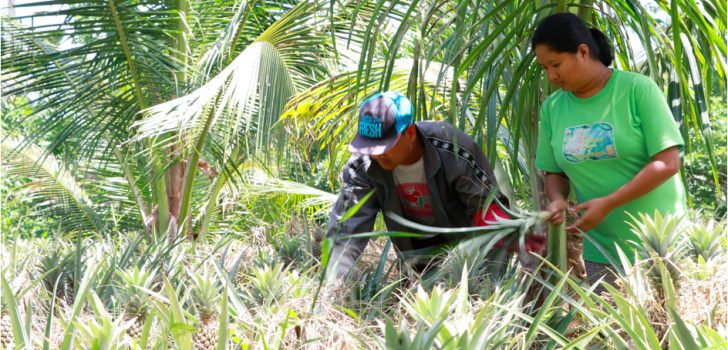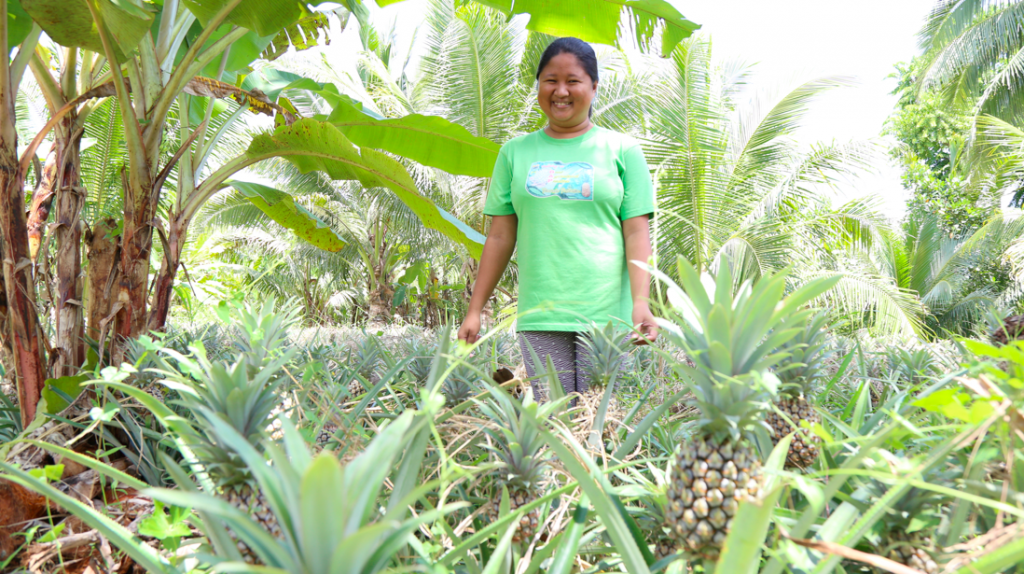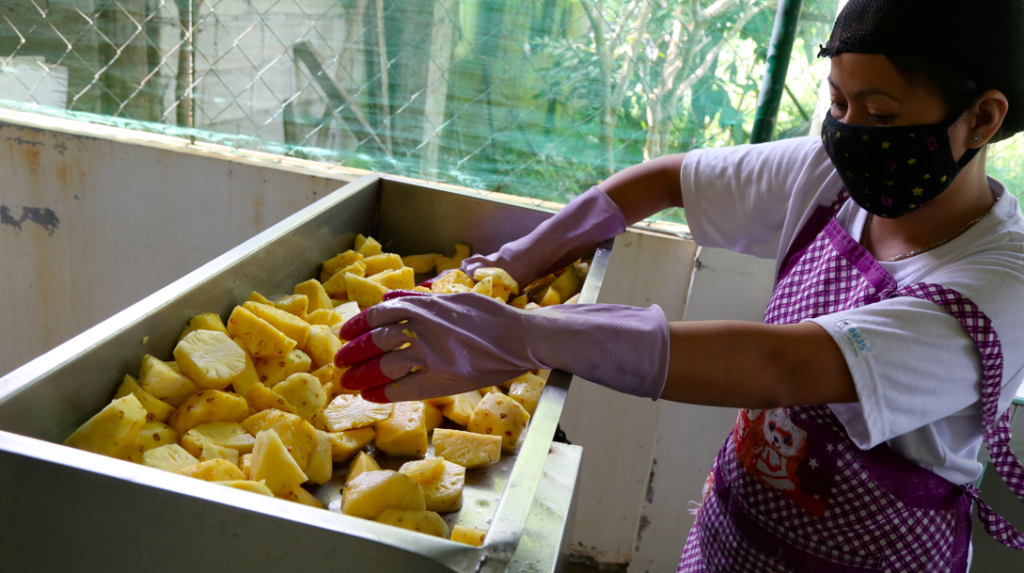 Young farmer Loryn Nala-Raro and her 50-year-old father Loreto Nala work as partners in tending their pineapple farm in Brgy. Iberica Labo, Camarines Norte. (Photo by Joseph R. Caldino, DA-PRDP NPCO InfoACE Unit)
Young farmer Loryn Nala-Raro and her 50-year-old father Loreto Nala work as partners in tending their pineapple farm in Brgy. Iberica Labo, Camarines Norte. (Photo by Joseph R. Caldino, DA-PRDP NPCO InfoACE Unit) Young Bicolano pineapple farmer dispels belief that farming is for the aged
LABO, CAMARINES NORTE – Are Filipino farmers a dying breed? According to the Integrated Regional Information Networks (IRIN), an independent, non-profit humanitarian news and analysis outlet based in Geneva, Switzerland, a Filipino farmer’s average age is 57 which means that at an average life span of 70, the country might reach a critical shortage of farmers in 15 years. Younger generations nationwide opt to leave rural areas to pursue careers in commercial centres close to Metro Manila.
But not 23-year-old Loryn Nala-Raro of Brgy. Iberica in Labo, Camarines Norte.
Since childhood, Raro has witnessed how her father, 50-year-old Loreto Nala, tilled their 14,999 square-meter farm. Every day, Nala would wake up before daybreak and spend an entire week tending his farm where various crops are planted including pineapple, eggplant, string beans, corn, papaya, and banana. Her father’s hard work and passion for soil inspired Raro to take formal studies in Agriculture at Camarines Norte State College and pursue a career as agritechnician.
“Napakasipag po ng tatay ko kaya na-motivate ko ang aking sarili. Nakabase po ako dito sa farm para mapaunlad ko po ang aming kabuhayan (My father is very hardworking. I decided to stay here at the farm to develop our livelihood),” Raro said.
Raro is one of the youth farmer-members and contract growers of Labo Progressive Multi-Purpose Cooperative (LPMPC). LPMPC is the proponent group of the P26.97 million-worth enterprise development (I-REAP) subproject entitled Camarines Norte Pineapple Trading and Processing Project in Labo, Camarines Norte funded by the Philippine Rural Development Project (PRDP). Through time and continued practice, Raro has developed a similar passion for farming like her father.
“Napakahalaga ng pagtatanim. Napakalaki ng impact nito sa akin. Bata pa lang ako, magsasaka na ako, tumutulong ako sa aking mga magulang na naghimok din sa akin na mag-aral ng Agriculture para matulungan ko ang ibang kabataan na mai-angat din ang kanilang antas ng pamumuhay. Napakalaki po talaga ng maitutulong ng agrikultura. Unang-una hindi po tayo mabubuhay kung walang agrikultura kasi doon po tayo kumukuha ng ating makakain (Farming is very important. It has very large impact on me. Since childhood, I’ve been into farming, I assist my parents who also motivated me to study agriculture so I could help raise other youths’ quality of lives. Agriculture is invaluable. First and foremost, we can’t survive without agriculture because it is where we source our food),” she added.

OT A DYING BREED. At 23, Loryn Nala-Raro of Brgy. Iberica Labo, Camarines Norte is even more inspired to develop her passion for farming and share her knowledge with other young farmers because of the PRDP-funded Pineapple Trading and Processing Center in Labo, Camarines Norte. (Photo by Eduardo D. Collantes Jr., DA-PRDP Bicol RPCO InfoACE Unit)
LPMPC sends its youth farmer-members like Raro to various trainings such as those on organic farming and integrated farming. Raro shares her knowledge with cooperative members and applies innovative farming practices. With support from her godfather, an Australian citizen, Raro practiced her knowledge in organic farming and now, their pineapple farm is already Good Agricultural Practices (GAP)-certified. She also announced that she will be leaving for Netherlands soon to attend further agricultural trainings.
Raro envisions turning their farm to an agri-tourism site and she sees more opportunities and potentials with the approved PRDP subproject designed to upscale the province’s Queen “Formosa” pineapple industry.
“Mas mapapalawak namin ang pagtatanim ng pinya at madadagdagan ang aming kita. Makakatulong ito sa mga farmers pati sa mga taong walang hanap-buhay (We can expand our pineapple farm and increase our income. It will help the farmers and even the unemployed individuals in our community),” she said.
The PRDP-funded Pineapple Trading and Processing Center subproject that will be implemented under the I-REAP component, will boost fresh pineapple fruits trading and upgrade pineapple juice production. By producing fresh pineapple fruits and pure pineapple juice, it targets to raise the quality of lives of 9,140 beneficiaries, particularly its 72 farmer-owners by P4,800 to P8,159 on its first year of implementation. The pineapple farmer-members will also receive an annual average dividend sharing worth P487 through the Project, while the non-members will get an additional P1 markup and P0.25 per year for every piece of fresh pineapple fruit including the batterball-sized pineapples.

The P26.97 million-worth PRDP-funded Pineapple Trading and Processing Center of the Labo Progressive Multi-Purpose Cooperative (LPMPC) adds value to the Queen “Formosa” pineapple, by upgrading fresh pineapple fruits trading and pineapple juice production. (Photo by Eduardo D. Collantes Jr., DA-PRDP Bicol RPCO InfoACE Unit)
Raro said that the PRDP subproject will encourage pineapple farmers to plant more because they now have a sure market.
“Madadagdagan ang mga bibili ng kanilang produktong pinya. Sa pamamagitan ng proyektong ito, hindi na sila mag-aatubiling magtanim. Hindi na rin sila mangangamba na mabulukan ng pinya sapagkat meron nang LPMPC na bibili ng kanilang produktong pinya (There will be more buyers of our pineapple products. Through this Project, they won’t have to hesitate to farm. They won’t have to worry about perishable pineapple fruits because LPMPC is there as a sure market of their pineapple products),” she added.
PRDP is a six-year World Bank-assisted national project under the Department of Agriculture. The Project aims to raise farmer and fisherfolk beneficiaries’ real household annual income by 5 percent, increase the incomes of targeted beneficiaries involved in I-REAP by 30 percent, increase the value of annual marketed output by 7 percent and increase the number of farmers and fisherfolk with improved access to DA services by 20 percent by establishing a modern, value chain-oriented and climate-resilient agri-fishery sector in the countryside. (Annielyn L. Baleza, DA-PRDP Bicol RPCO InfoACE Unit)
